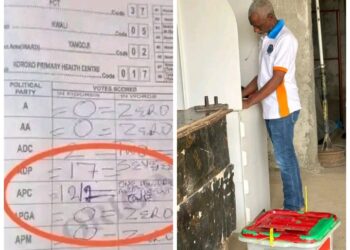The Green Chamber (HoR) has advanced a bill seeking to compel eligible Nigerians to vote during national and state elections or face legal penalties.
The bill, co-sponsored by Speaker Abbas Tajudeen and Hon. Daniel Asama Ago, proposes a six-month jail term or a fine of N100,000 for citizens who refuse to participate in elections without valid reasons.
Passed through a second reading on the floor of the Green Chamber, the proposed legislation aims to amend several sections of the Electoral Act, including Sections 9, 10, 12, and 47, to enforce voting among adults aged 18 and above.
A key provision of the bill introduces Section 47(4a), which states that voting is mandatory for all registered voters within the legal voting age, and that failure to fulfill this civic role without justification will be punishable upon conviction.
The bill allows for limited exemptions in cases such as ill health, religious beliefs, or citizens living abroad, but insists that citizens must not be indifferent to the leadership selection process.
Hon. Daniel Ago, while leading the debate, emphasized that the country’s democracy is hampered by recurring voter apathy. Citing the 2023 general elections where fewer than 30 percent of registered voters turned out, he argued that low participation undermines electoral legitimacy and national development.
The lawmaker also pointed to countries like Belgium, Brazil, and Australia where mandatory voting is in place, noting that such systems have led to broader participation and strengthened accountability.
Several members, however, expressed skepticism. Lawmakers including Hon. Awaji-Inombek Abiante, Hon. Mark Esset, and Hon. Ghali Mustapha raised enforcement concerns, especially in hard-to-reach areas and regions affected by conflict. They also questioned the fairness of punishing citizens in an electoral system where outcomes are frequently contested.
Another point of contention was the risk of infringing on personal freedoms. Critics of the bill said compelling participation through sanctions could amount to coercion, especially when public trust in the electoral process remains fragile.
Despite these objections, Deputy Speaker Benjamin Kalu and Hon. Akarachi Amadi backed the proposal, arguing that increased turnout would help restore faith in the democratic process and make citizens more involved in governance.
Speaker Abbas Tajudeen, responding to the concerns, maintained that the bill was a step toward building a more participatory political culture. He called on Nigerians to recognize voting as a shared national responsibility, not merely an optional act.
Although the voice vote seemed to tilt toward rejection, the Speaker ruled in favor of the bill’s progression. It was referred to the Committee on Electoral Matters for further scrutiny.
The debate surrounding the bill reflects a broader national conversation about how to strengthen public engagement in governance, and whether compulsion is the right path forward in doing so.





